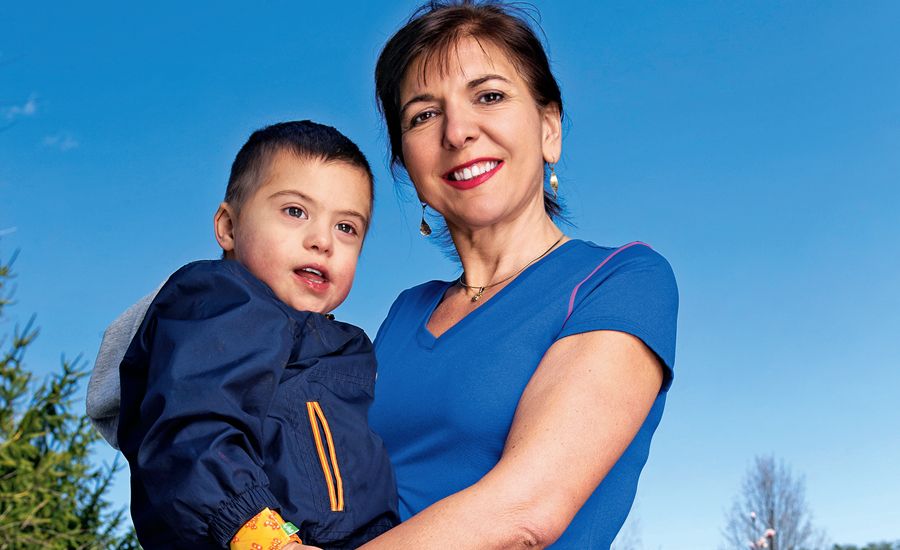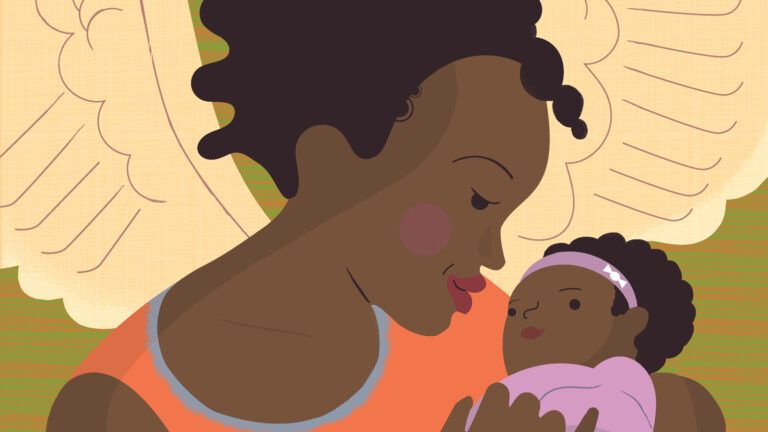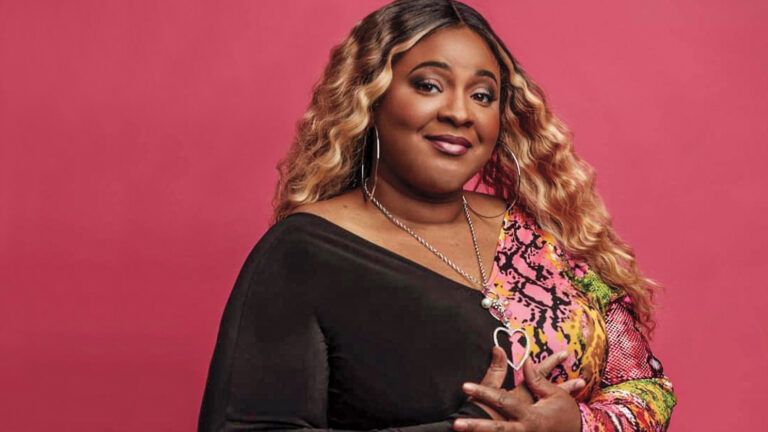It was three hours before we knew. Three hours I had to wait and wonder. And worry. I’d barely had a chance to hold my newborn son, Isaac, when the neonatology nurse whisked him away. “His blood oxygen levels are low,” she said, “but he should be fine.” I tried to settle back in my hospital bed and relax.
“Do you think our baby’s okay?” I asked my husband, Ray.
He squeezed my hand. “No news is good news.”
Not for me. My mind kept cycling through everything that could be wrong. Disabilities. Birth defects. Developmental delays. If it was serious, they would’ve told us by now, right?
My doctor had warned us from the very first sonogram. At my age, 43, I had a much higher risk of having a baby with chromosomal abnormalities like Down syndrome. I wasn’t worried then. I was just thrilled to be pregnant.
I never thought I’d get married, let alone have kids. Not with my history. My mother was mentally ill and my father was an alcoholic. It fell to me to keep everything together. Except I couldn’t save Mom from mental collapse, couldn’t keep our family from falling apart.
By the time Ray came along, I was 37 and had given up on finding a soul mate. What business did I have raising a family with my baggage?
Ray was 12 years older, a talented painter. His family had struggles too, and he knew what it was like to grow up the way I had. We fell in love and got married. I gave birth to our first son, Pierce, when I was 40.
Three years later, I was pregnant again. An answer to prayer, I told people. An ultrasound revealed markers for possible birth defects. My doctor recommended amniocentesis to test for genetic disorders. But the procedure carried a risk of miscarriage, and besides, I was determined to have my baby regardless.
Now I wished I had answers. What if Isaac had a condition that would keep him from living a normal life? Would he be an outsider like I’d been growing up? What if he was so severely disabled that he didn’t recognize me as his mother? What if he didn’t know I loved him?
God wouldn’t give me that kind of responsibility, would he? Not after I’d failed my parents. He wouldn’t entrust someone like me with a child who had special needs.
The nurse came back in. Finally.
“When can I see…” I started to ask. Then I saw the look on her face.
“Isaac has Down syndrome,” she said. “We’ll know more when the tests come back. The doctor will fill you in.”
READ MORE: BRINGING JOY TO SPECIAL CHILDREN
The week I spent at the hospital was a blur. More tests, consultations, information packets, phone call after phone call from well-meaning friends. “With God’s help, we’re taking things one day at a time,” I e-mailed everyone.
But reality set in when we brought Isaac home. There was no nursing staff on call. No book that could really tell me how to parent a special-needs baby.
At night I lay awake, fears mushrooming. Ray and I were older parents. What would happen to Isaac after we were gone? Would he be able to get a job? Live on his own? Was it fair to saddle Pierce with being his brother’s caregiver?
Isaac met with a developmental specialist right away, and I employed my own kind of therapy. Morning, noon and night I rocked him and sang him songs that I made up. I swaddled him in a blanket I’d made out of soft fleece. Anything I could think of to strengthen our bond, to show him I loved him, to quiet my worries.
He fit so naturally in my arms, just as his brother had. But he didn’t respond to me the way Pierce had at the same age. At two months, Isaac didn’t smile or coo at the sound of my voice. When I nursed him, he looked past me. Never at me. I moved my face to catch his gaze. Nothing. Not even a flicker in his beautiful hazel eyes. It was like I didn’t exist.
“My own baby doesn’t know me!” I sobbed to Ray.
“Don’t stress,” Ray said. “Isaac will develop on his own schedule.”
What if he never did? What if he never knew me?
Running on the treadmill in our bedroom became my stress relief. As I ran, I told God my fears and frustrations. I reached out to other special-needs moms. They all seemed to have their lives together. It was like they understood their child’s every need on a deep, almost spiritual level. Me? I couldn’t even get my baby to look at me.
Isaac started physical therapy at five months. Maybe things will change now, I told myself. His therapist, Mary Jane, specialized in early intervention treatment. At Isaac’s first few appointments, she worked on helping him roll over, reach for toys and sit up on his own.
“Hypotonia, or low muscle tone, is very common in children with Down syndrome,” she said. “Our goal is to increase Isaac’s strength little by little.”
Hypotonia could affect Isaac’s mobility, even his ability to interact with other kids. If he couldn’t hold a ball or a toy, he might get left out at playtime. I worked on the exercises with Isaac the next day. Pierce watched from his corner of the play mat, planting kisses on his baby brother now and then.
No matter how I stretched and moved his limbs and torso, Isaac’s body stayed floppy. He could barely lift his head.
I woke up early one morning to pray, then jumped on the treadmill. Why had God given me Isaac? He needed a more capable mother, someone who could really reach him and help him. I strapped on my wrist weights and picked up my pace. Too bad Isaac doesn’t have weights like these to build muscle tone. If only—
I stopped the treadmill and studied the weights. The design was simple—a weighted band, adjustable strap and Velcro closure. Could I make Isaac his own mini version? Hadn’t Mary Jane talked about building strength little by little?
I hopped off the treadmill and grabbed my sewing basket. Scraps of blue fleece dotted with cars and trucks, left over from the blanket I’d made Isaac. That would work for the band. What about the weight? I needed something light, something he would hardly notice.
Sand? I scooped a cup from Pierce’s sandbox in the backyard and got to work. My creation was complete in an hour. I weighed it on the kitchen scale—less than an eighth of a pound. Could this really work?
When Isaac woke, we went through the exercises again. This time, I slipped the bands around his wrists. I stretched his arms and legs. We reached for toys and turned the pages of a book.
“He looks like a baby bodybuilder!” Ray said with a laugh.
We did exercises with the weights for half an hour each day. After two weeks Isaac seemed less floppy. Mary Jane was blown away by his progress. “Isabella, I’m so impressed!” she said. “I’ve never seen weights like these for little kids.”
I gave Mary Jane the ones I’d made to test out with her other clients and put together a new set for Isaac, filled with a quarter pound of sand. I upped our exercise time to an hour. It was the highlight of my day. Isaac still wouldn’t meet my gaze. Maybe he never would. But now I knew I was helping him.
Mary Jane’s other patients showed promising results with the weights. I searched online for similar products. I couldn’t find a company that sold weights for infants or special-needs children.
If my little invention worked for Isaac, surely other kids could benefit. What if I started my own company? “Go for it!” Mary Jane said. I tested fabric options, contacted manufacturers and researched safety standards.
Isaac’s progress was slow but steady. By nine months, he was strong enough to wear the weights beyond exercise time, even when he nursed. With Mary Jane’s help, he learned to grasp toys and roll over on his stomach. Ray, Pierce and I cheered every time Isaac reached a new milestone.
One morning while he was nursing, I sang Isaac one of my made-up songs. “I love Isaac, my dear little Isaac. How I love Isaac, my pride and my joy….” Isaac’s gaze shifted. His eyes locked on mine. I didn’t dare move. He looked at me for what felt like an eternity. Not past me. At me. Like I was the only person in the world.
He knows me! I wanted to shout. He knows I love him! How could I have doubted it? Isaac would learn to do everything he needed to. Socialize, walk, talk. Not on some developmental chart’s timetable, or my timetable, but in his own time. In his own way, as God designed.
Today Isaac is a five-year-old chatterbox who charms everyone he meets. MightyTykes, our company, is thriving too. Our weights have helped thousands of children of all ages and abilities. They’re different by design, like all of us, and like the mighty tyke who inspired them.
Did you enjoy this story? Subscribe to Guideposts magazine.






